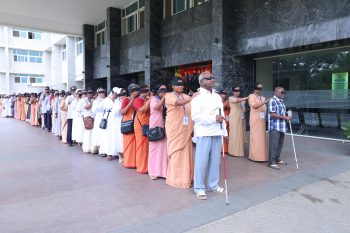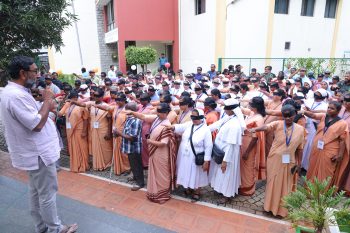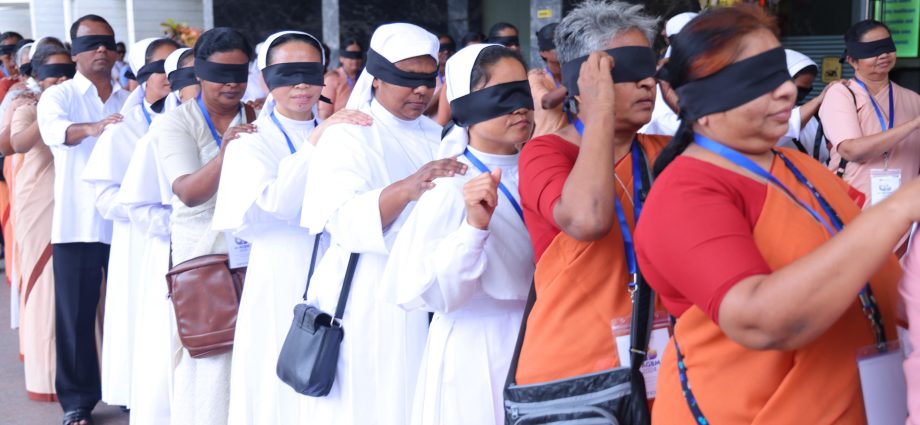By Kampan Chinnam
Bengaluru, Oct. 1, 2024: More than 200 nuns, priests and lay Catholics walked blindfolded in Bengaluru to raise awareness of the challenges faced by the visually impaired.
“Christians in India can solve the problem of the shortage of corneas in India, which has one third of the world’s visually challenged people — 15 million,” said Claretian Father George Kannanthanam, who organized the walk during the annual general body meeting of the Catholic Health Association of India (CHAI), the largest nongovernmental network of health professionals in the country.
As many as 317 people involved in healthcare in various parts of India attended the September 26-28 program at St. John’s Medical College in Bengaluru.
The theme for this year, “Long-Term Sustainability of Healthcare Mission,” stressed the importance of developing healthcare initiatives that can adapt over time to effectively meet the needs of communities.
The meeting highlighted the Church’s leadership and commitment to health initiatives for vulnerable populations, said Holy Cross Bishop Lumen Monteiro of Agartala, the association’s ecclesiastical adviser.
Father Kannanthanam, the association’s outgoing national secretary, said the blind walk was a novel idea developed by Project Vision, an initiative of Claretians under his leadership.
According to him, 10 percent of the visually challenged in India can get sight through corneal transplant. “But unfortunately, eye donations are very rare among Christians,” he told Matters India.

He said the blind walk by the participants has given them the experience of what it means to blind.
The walk was led by two blind persons, and it ended with a pledge by the participants to donate their eyes and to promote the eye donation movement through their institutions.
“They were all asked to conduct a blind walk in their centers in connection with World Sight Day, on October 10,” Father Kannanthanam said.
Most participants were directors and administrators of the member institutions of the association.
After the walk, many said it was their first experience to understand the difficulties of the visually challenged people. They promised to become Vision Ambassadors by taking the eye donation message to their institutions.
Father Kannanthanam presented them various strategies of promoting the eye donation movement through opening eye banks, starting eye collection centers and appointing counsellors to motivate the family members to donate eyes after death.

She was among the 21 participants from northeastern India.
Father Esack Rayappan, secretary of the Northeast Community Health Association, said the strong participation from his region demonstrated the Church’s dedication to providing quality healthcare as a vital service to society.
Maria Bambina Sister Laliamma Mathew, said the meeting underscored the importance of inclusivity in healthcare initiatives.
The participants reflected a broader outreach across diverse regions, ensuring healthcare discussions address the unique needs of different communities in the country, said Sister Teena, a member of the Sisters of the Destitute.
The CHAI is a network of 3,572 healthcare and social service institutions across India, organized into 11 regional units. The association serves about 21 million patients each year, primarily from low-income backgrounds.











Delhi diocese started an eye donation campaign in wake of Yesu christ Jayanti 2000 in association with Venu eye bank.I was the proposer of the team in the preparatory committee and was a member of 15 member team under leadership of Fr Dev Das .we went to 14 parishes and our team spoke after holy communion in all masses of 12 major parishes of Delhi. and distributed more than 15000 forms for opting for the scheme.
We received 56 forms filled up that too from our parish.
Archbishop Allen De lastic finally decided that we will go for blood donation.
Our idea was like budhists of Sri Lanka, all Christians of Delhi will pledge their eyes after death and thereby raise our mission to alleviate suffering of the blind at no cost to us